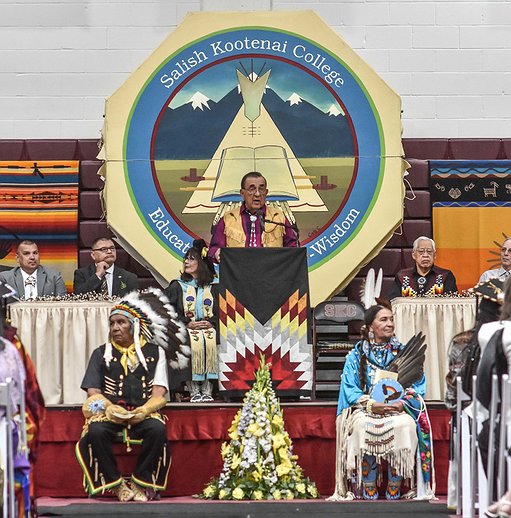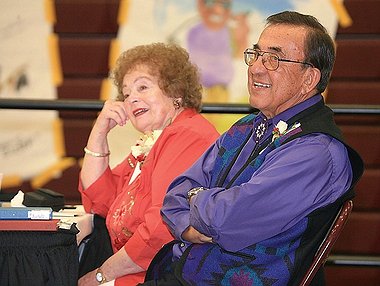"Icon of the Tribes": Visionary educator Joe McDonald dies at 92
Many flags across the Flathead Reservation are flying at half-mast this week in honor of Dr. Joe McDonald, a visionary educator and tribal leader who died last Thursday, Dec. 14. The founder of Salish Kootenai College was 92.
A public service and celebration of his life will be held Jan. 17, 2024, beginning at 10 a.m. with a Funeral Mass at the St. Ignatius Catholic Church in St. Ignatius. Following the service, a Celebration of Life luncheon will be held at the Salish Kootenai College Gym (the Joe) in Pablo.
The Tribal Council ordered that flags be flown half-staff from Dec. 15 through McDonald’s services on Jan. 17.
“Joe’s life of 90 years established him as an icon of the Tribes and an educational leader in Indian Country,” read a statement from the Council. “We send our prayers of comfort to his surviving family, Tim, Tracie, Tom, his grandchildren and great-grandchildren, and his countless relatives and many friends.”
Joe’s son, Tom McDonald, is Tribal Council Chairman.
The Lake County Commissioners ordered that courthouse flags fly at half-mast from Dec. 15-22 “as a mark of respect and in recognition of his service to all residents of the Mission Valley.”
“Joe was a quiet, but extremely effective leader,” said Commissioner Gale Decker. “I always admired him for his ability to move his agenda items forward without antagonizing anyone. He was always so calm, but reasonable.”
In a statement released Tuesday, U.S. Senator Jon Tester called McDonald “an inspirational leader and a pillar of Indian Country.”
McDonald, who was born in St. Ignatius in 1931, graduated from St. Ignatius High School and earned his an associate’s degree and teaching certificate in 1953 from Western Montana College (now UM-Western) in Dillon, where he became a starter in football, basketball and baseball. He also met his wife, Sherri, there and they were married the summer before their sophomore years.
He spent summers working for the U.S. Forest Service as a smokejumper to help defray the costs of college.
McDonald taught and coached at K-12 schools in Oilmont, Plevna, Miles City and Hamilton for more than a decade, and earned a bachelor’s in Education and master’s degree in Health and P.E. from the University of Montana. He was assistant basketball coach at UM from 1964-’65, and coached basketball and track at Northern Montana College in Havre from 1965-’67.
McDonald eventually returned to the Mission Valley, where he served as principal and assistant superintendent in Ronan while coaching several sports from 1967-1978. During his tenure as athletic director, Ronan claimed one state football championship, three track and field championships and three wrestling state championships.
McDonald also started the first Native American Studies program in Montana Public Schools. He noted in a 2021 interview that he had witnessed a gradual shift in understanding and sensitivity to tribal history. “If you go into Ronan schools today you still have George Washington there, but you have Chief Charlo too,” he said.
Founding a college
He served two terms on the CSKT Tribal Council from 1974-1982 and earned his doctorate in Education from UM in 1981. It was during that era that he began to lay the groundwork for Salish Kootenai College – undaunted by lack of funding, buildings, faculty or students. His quest to build a tribal college was aided by shifts in federal policy that allowed tribal nations to contract for services historically provided by the federal government, and legislation designed to support tribal colleges.
“I wasn’t alone,” he said in a 2021 interview on Montana Public Radio. “I was leading a whole large group that was part of this.” Major supporters included tribal elders, who saw a need to pass on cultural knowledge and perceived the college as a vehicle.
McDonald also understood that “for our tribe be able to exist, to compete and to serve the people well it takes a lot of educated people.”
He retired in 2010 after 33 years as president (and then President Emeritus) of the college, which now serves more than 600 students and employs around 70 full-time faculty.
"It's been a wonderful experience working here,” he said at his retirement party in the aptly named Joe McDonald Health and Athletic Center. “Each fall, I've gone to school since 1938."
Over the years, McDonald was ever-present at local sporting events, especially to cheer on his grandchildren and great-grandchildren, and in the last year, to watch his granddaughter, Brandie Buckless, coach the Lady Pirates. He saw school athletics as a way to keep kids engaged and motivated to learn.
“We both loved all sports, especially high school,” says Decker. “It was always a highlight of my day when I could sit and chat with Joe about sports.”
Numerous awards have been bestowed upon McDonald during his long and illustrious career in education and athletics. In 1974, he received the Sullivan Award from the Montana Amateur Athletic Union for his contributions to amateur athletics and he was inducted into the Montana Indian Athletic Hall of Fame in 2008. UM honored him with an Honorary Doctorate in Human Letters in 2005 and the UM Foundation added his name to the roster of the “50 Greatest Grizzlies.”
He’s received honorary degrees from Gonzaga University and Montana State University and distinguished alumni awards from UM and Western Montana College, and was named the National Indian Educator of the Year. On a local level, McDonald was inducted into the Ronan Hall of Fame last January as a “Distinguished Community Contributor.”
The Historian
Since his retirement, McDonald has continued to plumb the wealth of tribal history alongside SKC Librarian Emeritus Robert Bigart. They’ve collaborated on eight books, published by Salish Kootenai College Press. Some delve into historical documents dating back to 1845 to explore the history of the Salish, Pend d’Oreille and Kootenai people.
Others explore the McDonald family’s rich history on the reservation. Joe’s great-great grandfather was fur trader Angus McDonald, who constructed Fort Connah in 1847 – the last Hudson Bay Trading Post in the United States. The old fort still stands north of St. Ignatius on property that’s been in the McDonald family for generations, and Joe has been part of the Fort Connah Restoration Society’s efforts to keep that history alive.
Bigart and McDonald also co-edited a book by Charles Duncan McDonald, published in 2018 and titled “We All Believed Indian.” The manuscript was taken from the transcripts of audio and video interviews conducted with the tribal elder between 1982 and 1991, as he reflected on nearly a century of reservation life.
“Charlie was quite a storyteller. He had a good memory,” McDonald said last year of his great uncle. “The older you get though, the looser you can be with your memory because no one can contradict you.”
No one who knew Joe McDonald can contradict his legacy as an educator, an innovator and a leader. "His reach was far broader than his community," Montana State Legislator Carol Williams said at his retirement party.
“He wore many hats: teacher, coach, smokejumper, and founder of Salish Kootenai College,” wrote Sen. Tester. “But most of all, he was a beloved father, husband, and friend … He will be missed.”






